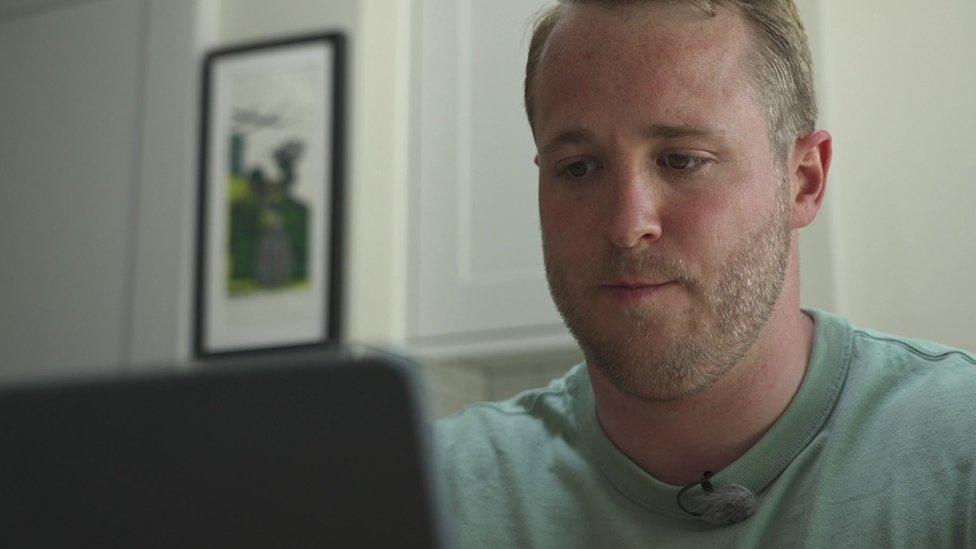Warning homeowners face 20% drop in disposable income
- Published
- comments

Rising interest rates could see 1.4 million mortgage holders lose more than 20% of their disposable incomes, a think tank has warned.
Some 690,000 of those set to be hit hardest will be under 40, the Institute for Fiscal Studies (IFS) said.
The body said high borrowing costs was "unquestionably going to cause serious difficulty for many families".
The Bank of England, which sets interest rates, is expected to raise them again to try to tackle inflation.
Data released on Wednesday showed inflation to be unchanged at 8.7% in the year to May, solidifying expectations that the Bank of England will raise interest rates by 0.25% to 4.75% on Thursday.
Inflation is the increase in the price of something over time.
The IFS, which is a politically independent economics-focused think tank, said that given inflation was at "levels not seen in decades, rising interest rates are essentially inevitable".
Its economists said many banks had increased mortgage rates again in recent weeks, in anticipation of the Bank increasing its base rate further.
That meant mortgage holders would pay on average almost £280 more each month compared to March 2022, if mortgage rates remained at around 6%. It said people aged between 30 and 39 would typically pay about £360 more.
Overall, 60% of those with a mortgage - 8.5 million adults - are set to spend more than a fifth of their incomes on mortgage payments, the IFS said.
"This is a substantial increase. In March 2022, only 36% of mortgagors were in this position. It also higher than in 2007-08," it added.
But the think tank pointed out while a third of all adults aged 20 and over have a mortgage, many are on fixed rate deals so have been shielded by rate rises, although around a quarter of such deals are due to finish by the end of this year, exposing people to higher costs.
"For some the rise will be substantially larger: almost 1.4 million - 690,000 of whom are under 40 - will see their disposable incomes fall by over 20%," the IFS said.
The Bank of England has been hiking interest rates since December 2021 in a bid to slow the rate prices are rising at. The Bank's base rate, which is used by lenders to set interest rates on mortgages, loans and credit cards, but also for savings accounts, is currently 4.5%.
In theory, raising interest rates makes it more expensive for people to borrow and they have less money to spend, meaning households will buy fewer things and then price rises will ease.
But inflation has not been falling as fast as hoped, and there have been calls for the Bank to be more aggressive with interest rates.
In recent weeks, lenders have been pulling deals and putting up rates at short notice in expectation of interest rates being hiked again.
On Wednesday, the average rate on a two-year fixed deal rose to 6.15%. In March 2022 it was 2.65%.
'Balancing act'
The Joseph Rowntree Foundation (JRF), which campaigns for people on low-incomes, said its research had found almost three-quarters of low-income households with a mortgage reported going in some cases without showers or had experienced "food insecurity" in the past month.
Alfie Stirling, JRF chief economist, said there was a "strong case" for the Bank to "take a pause for breath" and avoid raising rates until the impact of previous hikes had been fully felt.
"Rising interest rates won't prevent the UK becoming poorer, they merely reflect a choice over how and where the economic pain is felt; taking some of the hit away from faster price increases, towards those with debts, and ultimately hitting pay growth and job creation for us all," he said.
"It is a balancing act, which if misjudged, risks converting a medium-term price shock into a horrendous new normal for those who can least afford it."
Chancellor Jeremy Hunt has ruled out the government introducing major financial support to mortgage holders over fears it would "make inflation worse, not better".
But he said he would meet lenders later to ask what help they could give to households struggling.

Ewan has to find an additional £400 a month
Ewan Cameron bought a flat in London two years ago and has just managed to secure a new fixed deal, but not before he had two mortgage offers pulled.
He has now got to find an extra £400 a month to pay for his home, and is considering renting out the spare room to help pay for it.
"I remember speaking to a friend who bought at roughly the same time and he locked into a five year mortgage, we both joked about who would end up on the better end of the spectrum in a couple of years' time - he's certainly the one laughing and I'm certainly the one paying the price," he said.
The IFS said the UK's benefits system currently provides "relatively little support for low income mortgagors compared to what's on offer for low income renters".
It said this meant there was "not much of a safety net for those who are particularly likely to struggle with rate rises".
As well as different age groups being impacted by higher borrowing costs, the think tank said there were also differences in where people lived.
For example, it said average rises ranged from just over £150 in Northern Ireland to £390 per month in the South East and £520 in London.
It pointed out that it was not just homeowners under pressure, with renters seeing "very large increases" in recent months.
"It is likely that at least part of the increases in rents we are seeing is due to high interest rates hitting landlords' borrowing costs," the IFS said.
Data shared with the BBC has shown rent now typically accounts for 28.3% of income, compared with 27% on average for the past 10 years. A small rise in percentage terms can still have a significant effect on people's finances.

Sign up for our UK morning newsletter and get BBC News in your inbox.
